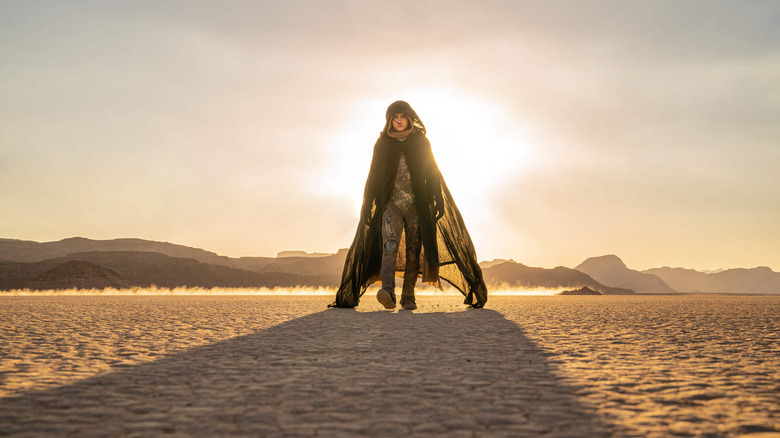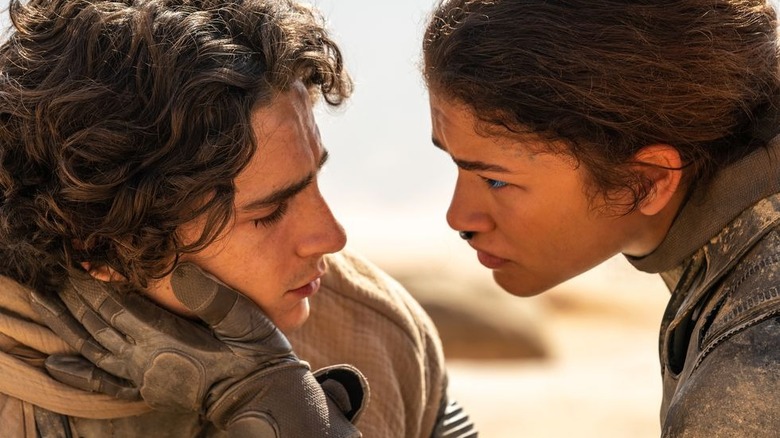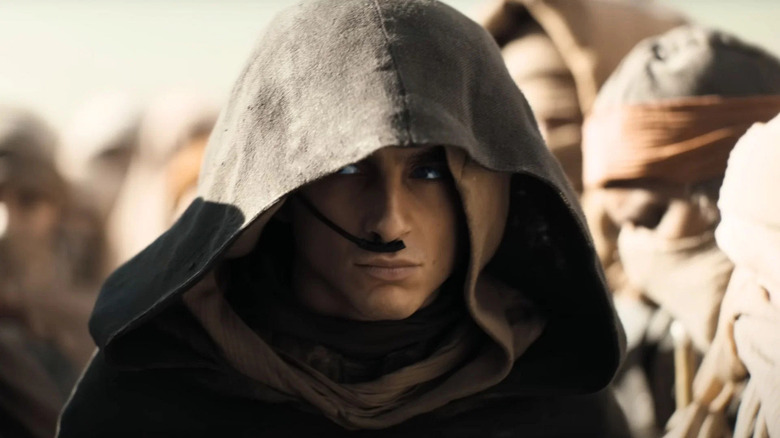Dune: Part Two Demands That Timothée Chalamet Step Up His Game – And He Pulls It Off
This post contains spoilers for "Dune: Part Two."
"It doesn't matter a damned bit how pure and good the hero is. By just being he creates a power structure and so it's like a magnet: the iron filings, the corruptible, come in and things are done in the name of the leader."
So said "Dune" author Frank Herbert in a 1984 interview with the L.A. Reader, neatly summarizing the cautionary tale at the heart of his epic sci-fi trilogy. In Paul Atreides, played by Timothée Chalamet in Denis Villeneuve's recent two-part film adaptation, Herbert wanted to create "a charismatic leader, a messiah you would follow for all of the right reasons. He is loyal to his people, he's honorable, and he's true to his friends." For that charismatic protagonist to then launch a galactic holy war, knowing that it would cause the deaths of tens of billions of people, was a hard thing for audiences to wrap their heads around back then, and it still is today. "[It] shook a lot of people," Herbert observed. "Here was a hero who didn't make everything all right."
Paul isn't tempted to the dark side, like Anakin Skywalker in the "Star Wars" prequels. He doesn't become an outright villain. He seeks a "narrow way through" the many horrifying possible futures and unflinchingly molds his actions to that path — even if it means demanding a princess bride right in front of the woman he loves or claiming to be the Fremen's prophesied messiah despite knowing the prophecy is Bene Gesserit propaganda.
It's a far more complex arc than that of a tragic hero fighting to survive the baddies who murdered his father, which we saw in "Dune." But in "Dune: Part Two," Chalamet steps up to the challenge.
The Mahdi is too humble to say He is the Mahdi
Thanks to some smart changes from the book made by Villeneuve, Chalamet doesn't have to shoulder the burden of Paul's dilemma alone. Chani (Zendaya), who is barely a character in the book and supports Paul pretty much unquestioningly, takes on an expanded role in "Dune: Part Two" as a leading voice in a faction of Fremen who do not believe in the prophecy. She suspects (correctly) that the promise of a leader from another world has simply been used to enslave them, and will now be used to turn them into an army for someone else's cause. This conflict, which mostly goes on inside Paul's mind in the book, is therefore externalized through the push-and-pull of the two characters.
For his part, Chalamet has admitted that he was impatient for Paul to get past his own inner torment and embrace his messiah status. "There were moments over the course of shooting the first film where I was yearning for Paul, after he left Caladan, to not still be in the process of formation," Chalamet told Total Film earlier this year. "My most common way of expressing that was: 'When does Paul become Muad'Dib?' [Denis] would always preach patience."
The actor's eagerness to become Muad'Dib definitely shows in the movie. Chalamet doesn't fully spring to life until after Paul drinks the Water of Life, opening his mind up to the ancestral memories of both his male and female forebears, which in turn allows him to see possible futures far more clearly. But the portion of the movie that he spends being humble and amiable and non-threatening is vital. That understated performance sets the stage for Paul's sharp, sudden, post-Water of Life pivot.
'Your mothers warned you about my coming'
For the bulk of "Dune: Part Two," Chalamet is exactly what you'd expect of any Hollywood movie trying to dress up the white savior narrative as something more palatable to modern audiences. He's modest, he humbly asks for guidance in learning the ways of the Fremen, and he shies away from claiming to be their messiah or even a leader. For his Fremen name, he chooses "Muad'Dib," after the cute little kangaroo mouse that hops around the desert. Okay, yes, at one point he starts to mansplain sandwalking to Chani, but he catches himself doing it and stops, recognizing his own arrogance.
This version of Paul is not particularly interesting, but he fits the classic archetype of a Chosen One reluctantly embracing the heroic destiny that has been thrust upon him. It sets both the audience and the Fremen up to expect that he will lead his people to freedom without abusing his power.
Then Paul drinks the Water of Life, sees the path ahead clearly, and that humble persona vanishes. He strides into the Council of Leaders like a very skinny wrestler making a grand WWE entrance. He spits on Fremen tradition that demands he kill Stilgar and take his place as naib before he's allowed to speak. To shut down any threat of a challenge, he fires off some devastating rounds of omniscience at one unfortunate Fremen fighter. He proclaims himself both Duke of Arrakis and the Voice from the Outer World and promises to bring them to paradise. It's dark and it's frightening ... but it's also extremely badass. It needs to be both because the audience can't stop rooting for Paul just yet. They still need to follow him into Camelot.


